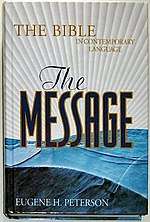''The Message'' (Bible)
| The Message | |
|---|---|
 | |
| Full name | The Message |
| Abbreviation | MSG |
| Complete Bible published | 2002 |
| Translation type | Idiomatic/Dynamic equivalence/Paraphrase |
| Copyright | Copyright 2002 Eugene H. Peterson |
|
First this: God created the Heavens and Earth--all you see, all you don't see. Earth was a soup of nothingness, a bottomless emptiness, an inky blackness. God's Spirit brooded like a bird above the watery abyss. God spoke: "Light!" And light appeared.
This is how much God loved the world: He gave his Son, his one and only Son. And this is why: so that no one need be destroyed; by believing in him, anyone can have a whole and lasting life. | |
The Message: The Bible in Contemporary Language was created and translated by Eugene H. Peterson and published in segments from 1993 to 2002. It is an idiomatic translation of the original languages of the Bible.[1] The Message was translated by Peterson from the original languages.[2] It is a highly idiomatic translation, using contemporary slang from the US rather than a more neutral International English, and it falls on the extreme dynamic end of the dynamic and formal equivalence spectrum.
Features
According to the Introduction to the New Testament of The Message, its "contemporary idiom keeps the language of the Message (Bible) current and fresh and understandable".[1] Peterson notes that in the course of the project, he realized this was exactly what he had been doing in his thirty-five years as a pastor, "always looking for an English way to make the biblical text relevant to the conditions of the people".[1]
Circulation
The Message was published piecemeal over a nine-year period. The New Testament was published in 1993. The Hebrew Bible Wisdom Books were published in 1998. The Hebrew Bible Prophets were published in 2000. The Hebrew Bible Pentateuch were released in 2001. The Books of History came out in 2002. The entire Bible was released the same year and follows the traditional Protestant Biblical canon.
Comparison to other translations
The Message was translated by Peterson from the original languages.[2] It is a highly idiomatic translation, using contemporary slang from the US rather than a more neutral International English, and it falls on the extreme dynamic end of the dynamic and formal equivalence spectrum. Some scholars, like Michael J. Gorman, consider some of Peterson's idiomatic renderings unconventional.[3]
Psalm 23:1-4
1 The Lord is my shepherd, I lack nothing.
2 He makes me lie down in green pastures,
he leads me beside quiet waters,
3 he refreshes my soul.
He guides me along the right paths
for his name’s sake.
4 Even though I walk
through the darkest valley,
I will fear no evil,
for you are with me;
your rod and your staff,
they comfort me.
1 The Lord is my shepherd; I shall not want.
2 He maketh me to lie down in green pastures: he leadeth me beside the still waters.
3 He restoreth my soul: he leadeth me in the paths of righteousness for his name's sake.
4 Yea, though I walk through the valley of the shadow of death, I will fear no evil: for thou art with me; thy rod and thy staff they comfort me.
The Message:
1–3 God, my shepherd!
I don’t need a thing.
You have bedded me down in lush meadows,
you find me quiet pools to drink from.
True to your word,
you let me catch my breath
and send me in the right direction.
4 Even when the way goes through
Death Valley,
I’m not afraid
when you walk at my side.
Your trusty shepherd’s crook
makes me feel secure.
Lord's Prayer (Matthew 6:9-13)
9 "This, then, is how you should pray:
'Our Father in heaven,
hallowed be your name,
10 your kingdom come,
your will be done,
on earth as it is in heaven.
11 Give us today our daily bread.
12 And forgive us our debts,
as we also have forgiven our debtors.
13 And lead us not into temptation,
but deliver us from the evil one.'"
9 After this manner therefore pray ye: Our Father which art in heaven, Hallowed be thy name.
10 Thy kingdom come, Thy will be done in earth, as it is in heaven.
11 Give us this day our daily bread.
12 And forgive us our debts, as we forgive our debtors.
13 And lead us not into temptation, but deliver us from evil: For thine is the kingdom, and the power, and the glory, for ever. Amen.
The Message:
9–17
Our Father in heaven,
Reveal who you are.
Set the world right;
Do what's best—
as above, so below.
Keep us alive with three square meals.
Keep us forgiven with you and forgiving others.
Keep us safe from ourselves and the Devil.
You’re in charge!
You can do anything you want!
You’re ablaze in beauty!
Yes. Yes. Yes.
Editions
Hebrew Bible:
- The Pentateuch: ISBN 1-57683-196-5
- The Books of History: ISBN 1-57683-194-9
- The Wisdom Books: ISBN 1-57683-126-4
- The Prophets: ISBN 1-57683-195-7
New Testament:
Entire Bible:
References
- 1 2 3 "Introduction to the New Testament, from The Message". Retrieved 2008-06-03.
- 1 2 "Version Information". Retrieved 2011-06-03.
- ↑ Gorman, Michael J. (2008). Elements of Biblical Exegesis: A Basic Guide for Students and Ministers. Baker Books. p. 51. ISBN 9781441232830. Retrieved 8 January 2016.
- ↑ "2006 Christian Book Awards Winners - Bibles category". Retrieved 2008-06-03.
External links
- Publisher's History & FAQ (most recently available archived version)
- The Message text online
- Eugene Peterson interview at a U2 fansite